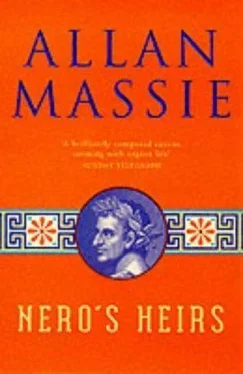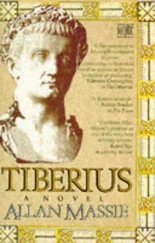Allan Massie - Nero_s Heirs
Здесь есть возможность читать онлайн «Allan Massie - Nero_s Heirs» весь текст электронной книги совершенно бесплатно (целиком полную версию без сокращений). В некоторых случаях можно слушать аудио, скачать через торрент в формате fb2 и присутствует краткое содержание. Жанр: Исторические приключения, на английском языке. Описание произведения, (предисловие) а так же отзывы посетителей доступны на портале библиотеки ЛибКат.
- Название:Nero_s Heirs
- Автор:
- Жанр:
- Год:неизвестен
- ISBN:нет данных
- Рейтинг книги:3 / 5. Голосов: 1
-
Избранное:Добавить в избранное
- Отзывы:
-
Ваша оценка:
- 60
- 1
- 2
- 3
- 4
- 5
Nero_s Heirs: краткое содержание, описание и аннотация
Предлагаем к чтению аннотацию, описание, краткое содержание или предисловие (зависит от того, что написал сам автор книги «Nero_s Heirs»). Если вы не нашли необходимую информацию о книге — напишите в комментариях, мы постараемся отыскать её.
Nero_s Heirs — читать онлайн бесплатно полную книгу (весь текст) целиком
Ниже представлен текст книги, разбитый по страницам. Система сохранения места последней прочитанной страницы, позволяет с удобством читать онлайн бесплатно книгу «Nero_s Heirs», без необходимости каждый раз заново искать на чём Вы остановились. Поставьте закладку, и сможете в любой момент перейти на страницу, на которой закончили чтение.
Интервал:
Закладка:
One consequence of my father's patronage was that Vespasian's elder son Titus was brought up in court circles where he became the companion and closest friend of Tiberius Claudius, later known as Britannicus, the son of the Emperor and the dissolute Messalina. Britannicus and Titus were some five or six years older than I was myself, and I was six months older than Domitian. I may say that, though Domitian was designated my playmate, he was as a very small boy, shy, surly, and disinclined for any company, even mine. Titus and Britannicus, in contrast, were dazzling and alluring. Soon however both were to be cast into the shade by Nero, when he succeeded his (murdered?) stepfather as Emperor.
Posterity will, rightly, recall Nero as a monster of depravity, and as an Emperor who disgraced the purple he wore. History will judge him severely. You, my dear Tacitus, will make sure of that. I can't blame you. I don't even wish to blame you. After all, I suffered at the beast's hands myself. Not only did he have my natural father Narcissus put to death, but once when I was a boy of eleven he seized me in the gymnasium, and crying, The wolf is ready to ravish you', attempted precisely that.
Before Narcissus was dislodged, he had had Vespasian appointed Governor of Africa, where, though no great success, and once pelted with pumpkins by riotous provincials, he was at least at a safe distance from Nero. Actually, Nero had no dislike of him, since he neither feared nor envied him. He saw him as a butt. Vespasian's wooden countenance inspired him to all sorts of childish and malicious jests. So Vespasian was more fortunate than those who provoked Nero's jealousy.
Yet Nero had charm. I hope you will make that clear. Even Petronius, whom he called his Arbiter of Elegance, and who despised him as only a clever and unhappy man can despise a boisterous clown, testified to that. Petronius was a friend of my mother. When I was fourteen he sought to make me his catamite, but I would not have it. I directed him to Domitian instead. He shuddered and said, That scrofulous boy? You can't be serious.' 'Well,' I said, 'I assure you he would be willing, as I am not.' He laughed. I admired Petronius but he smelled of rotten apples. It was some sort of disease, I suppose. He used to read his novel, The Satyricon, to me. I think he hoped that its obscenity would excite me to grant him his desire. But I was then in a virtuous mood. A boy of fourteen can be very priggish.
This is not what you want to hear. You want to know about Domitian's boyhood.
But I'm a little drunk, as I usually am by evening. I'll close this letter, and continue tomorrow. Ill My father divorced my mother as soon as Narcissus was disgraced. He hadn't dared do so before. Then he withdrew to sulk on his estates in the hills beyond Velletri, to write lame verses (his Tristia) in feeble imitation of Ovid. I never saw him again.
My beautiful mother, whose own parents were dead and whose elder brother for some years refused to receive her or even provide for her, as was his duty, now found herself poor and almost friendless. She carried me off to a third-floor apartment in an insula, in the fourteenth region of the city on the other bank of the Tiber. It was all she could afford and was a miserable place, damp and cold in winter and, on account of the low ceilings and the fact that it looked onto an airless inner courtyard, intolerably hot in the summer which we could not escape, as people of our class were accustomed to, by retreating to the hills or the seaside. Our neighbours were the lowest sort of people, some of whom on winter nights used the common staircase to relieve themselves rather than venture forth to the icy public latrines. My own chamber was a mere cupboard, without ventilation, and on sleepless nights I lay there planning my future and the revenge I would take on the world for the misfortune which had so early engulfed me.
My mother bore her far greater ill-fortune stoically. She spent long days polishing her jewellery and her memories. In time, to pay for my education, she sold her jewels, piece by piece. She lived, I see now, only for me, and denied herself luxuries, even on occasion necessities, in order that I might make a show in the world. At the time I understood nothing of her self-denial, and resented the demands she made on me, and her refusal to allow me to play with the ragged and often criminal boys of our wretched quarter.
So we had few friends. That is how I came to pass so much of my childhood with Domitian. His circumstances resembled mine. He was boarded with an aunt – a sister of his father – in the Street of the Pomegranates in the sixth region, a neighbourhood little more salubrious or respectable than ours. You may think the distance between our homes makes our companionship surprising, since half the city lay between us. But the explanation is simple. His aunt revered my mother, who had been kind to her (she frequently said) in her days of prosperity. This aunt had buck teeth, stammered, and was nervous of strangers. So she would lead the young Domitian all the way over to Trastevere to pay her respects to my mother. For her part, my mother found the aunt useful. She had few domestic skills herself (how should she have had?), was reluctant to leave our apartment, despised our neighbours, or at least kept her distance from them, which incidentally increased the respect they held her in. Two lonely women, resenting the world, fearing it in the aunt's case, despising it in my mother's, they formed an alliance of convenience.
The child, they say, is father of the man. True, I suppose, though I have known those, myself among them indeed, who react so fiercely against the constraints of their childhood that, in retrospect, it is hard to believe that the adult man grew out of the child.
I could say more on this matter. But you do not wish my autobiography and, indeed, in bitter exile I have no taste to write it.
Domitian then: as a child, he was silent, brooding, resentful. You know how in his time as Emperor he was said to amuse himself by stabbing flies with his pen, so that the joke went round that 'No one was with the Princeps, not even a fly.' The jest was not without substance; he was the kind of little boy who delights in pulling the wings off insects, legs off spiders, and so on. Once, I recall, he brought a live frog to our apartment and proceeded to dismember it. When I begged him to refrain from torturing the beast, and at least to kill it before he anatomised the wretched creature, he muttered, without lifting his shaggy head – you remember how he could never look one in the eye – that he learned more by dissecting what was still alive. He had, he said, a keen interest in the nervous system. I think he was ten at the time. His shaggy head was then sometimes infested with lice, for his aunt was short-sighted, and indifferent to such matters in any case. He went bald early, as you know; more cause for resentment.
In those days he didn't care for me. I put that wrongly. He disliked me. The reason was simple: my excellence rebuked his incapacity. I learned easily what he struggled to retain. For some years we attended the same schoolmaster, a Greek grammaticus, by name Democritos. He was a rough brutal man, fond of the rod. I believe his chief pleasure lay in chastising his unfortunate pupils. Domitian, being slow and of little account socially, was a choice victim. I have often seen his legs run with blood. Furthermore, the terror he displayed when condemned to a beating merely incited our master's ardour. The more Domitian howled for mercy, the harder the strokes fell. Once, at least, the wretched boy pissed himself in his abject fear. This naturally made him an object of mockery to his fellows. You will not be surprised to learn that after he became Emperor he had his agents seek out the now aged Democritos, drag him from the dingy apartment where he lingered, and bring the wretch before his former pupil who, spurning him with his toe, ordered him to be whipped to death. 'For,' he said, 'this man is so fond of the rod that it is only fitting that the rod should be the last thing he experiences in life.'
Читать дальшеИнтервал:
Закладка:
Похожие книги на «Nero_s Heirs»
Представляем Вашему вниманию похожие книги на «Nero_s Heirs» списком для выбора. Мы отобрали схожую по названию и смыслу литературу в надежде предоставить читателям больше вариантов отыскать новые, интересные, ещё непрочитанные произведения.
Обсуждение, отзывы о книге «Nero_s Heirs» и просто собственные мнения читателей. Оставьте ваши комментарии, напишите, что Вы думаете о произведении, его смысле или главных героях. Укажите что конкретно понравилось, а что нет, и почему Вы так считаете.












